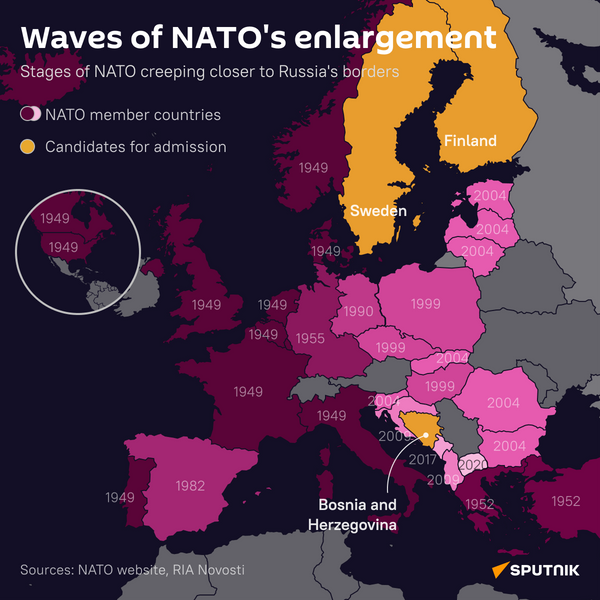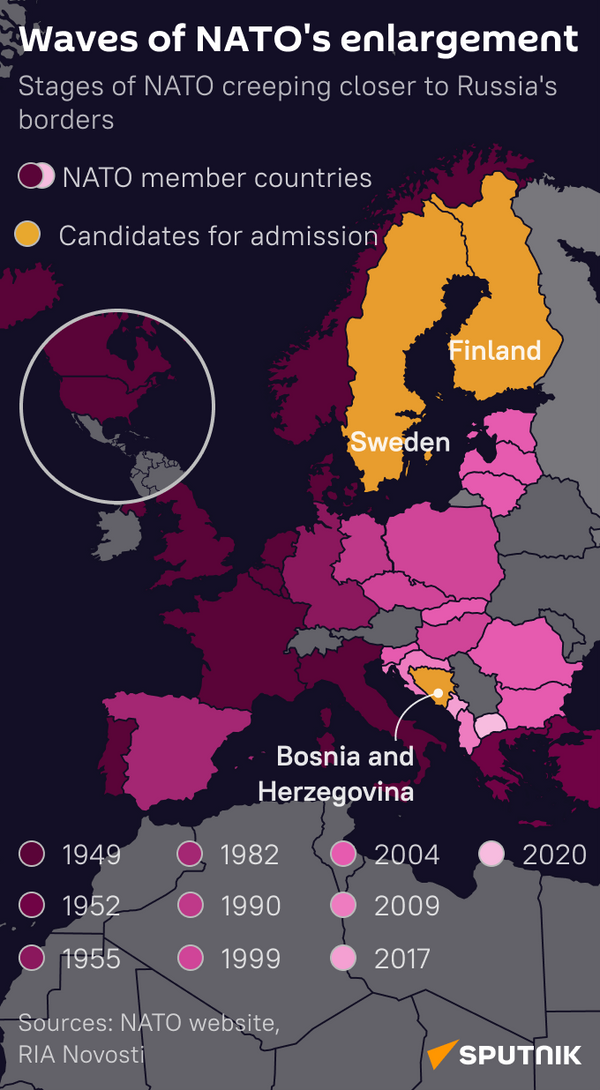https://en.sputniknews.africa/20230320/1058524972.html
A Fateful Error: History of NATO's Expansion
A Fateful Error: History of NATO's Expansion
Sputnik Africa
Jens Stoltenberg met with Finland’s foreign and defense ministers on Monday following announcements by Turkish and Hungarian officials that they would move forward in ratifying the Nordic nation’s alliance membership bid.
2023-03-20T18:00+0100
2023-03-20T18:00+0100
2023-04-12T11:19+0200
infographic
north atlantic treaty organization (nato)
finland
united states (us)
united kingdom (uk)
russia
soviet union (ussr)
https://cdn1.img.sputniknews.africa/img/07e7/04/0c/1058525135_0:0:1280:720_1920x0_80_0_0_112d355e4ee518ef62c3ca088ee01ab5.png
Finland is on course to becoming the 31st member of the Western alliance, with its entry to constitute the ninth wave of expansion by the US-led bloc.“It is possible that Finland joins NATO before Sweden,” Finnish President Sauli Niinisto told a Swedish broadcaster on Sunday. “Should we have refused Turkiye’s offer to ratify? That sounds a bit crazy. It would have been a terribly difficult situation if we had said ‘no’ to Ankara,” he said.In his own comments Monday, Jens Stoltenberg said that “the most important thing is that both Finland and Sweden become members” of NATO “as soon as possible, not that they join exactly the same time.”Since its creation in 1949, the original 15-member-bloc has doubled in size, expanding into Greece and Turkiye in 1952, West Germany in 1955 (prompting Moscow to create the Warsaw Pact), and Spain (1982). In 1990, Soviet leader Mikhail Gorbachev agreed to the absorption of East Germany by Bonn after getting a verbal commitment from then-Secretary of State James Baker that NATO would not expand “once inch east” beyond a reunified Germany. One year later, in 1991, the USSR collapsed, and the Western bloc’s reason d’etre – “containing Soviet-style communism,” disappeared.But the alliance did not follow suit, absorbing the Czech Republic, Hungary and Poland in 1999, and adding seven more countries, including Bulgaria, Romania and five former Soviet and Yugoslav republics in 2004. Expansion continued with the addition of four more Balkan countries between 2009 and 2020.In 1997, ahead of the first wave of expansion, George Kennan, the US diplomat who authored the US’s original containment doctrine at start of the Cold War, dubbed Washington's plans to expand the alliance eastward ‘A Fateful Error’, warning that doing so would ruin the then-friendly ties with Russia and make the world less safe.Explore Sputnik's infograpics to learn more!
finland
united states (us)
united kingdom (uk)
russia
soviet union (ussr)
Sputnik Africa
feedback@sputniknews.com
+74956456601
MIA „Rossiya Segodnya“
2023
Sputnik Africa
feedback@sputniknews.com
+74956456601
MIA „Rossiya Segodnya“
News
en_EN
Sputnik Africa
feedback@sputniknews.com
+74956456601
MIA „Rossiya Segodnya“
Sputnik Africa
feedback@sputniknews.com
+74956456601
MIA „Rossiya Segodnya“
nato's expansion, sputnik's infographic
nato's expansion, sputnik's infographic
A Fateful Error: History of NATO's Expansion
18:00 20.03.2023 (Updated: 11:19 12.04.2023) NATO chief Jens Stoltenberg met with Finland’s foreign and defense ministers on Monday following announcements by Turkish and Hungarian officials last week that they would move forward in ratifying the Nordic nation’s alliance membership bid after a lengthy delay. The fate of Sweden's bid remains unclear.
Finland is on course to becoming the 31st member of the Western alliance, with its entry to constitute the ninth wave of expansion by the US-led bloc.
“It is possible that Finland joins NATO before Sweden,” Finnish President Sauli Niinisto
told a Swedish broadcaster on Sunday. “Should we have refused Turkiye’s offer to ratify? That sounds a bit crazy. It would have been a terribly difficult situation if we had said ‘no’ to Ankara,” he said.
In his own comments Monday, Jens Stoltenberg
said that “the most important thing is that both Finland and Sweden become members” of NATO “as soon as possible, not that they join exactly the same time.”
Since its creation in 1949, the original 15-member-bloc has doubled in size, expanding into Greece and Turkiye in 1952, West Germany in 1955 (prompting Moscow to create the Warsaw Pact), and Spain (1982). In 1990, Soviet leader Mikhail Gorbachev agreed to the absorption of East Germany by Bonn after getting a verbal commitment from then-Secretary of State James Baker that NATO would not expand “once inch east” beyond a reunified Germany. One year later, in 1991, the USSR collapsed, and the Western bloc’s reason d’etre – “containing Soviet-style communism,” disappeared.
But the alliance did not follow suit, absorbing the Czech Republic, Hungary and Poland in 1999, and adding seven more countries, including Bulgaria, Romania and five former Soviet and Yugoslav republics in 2004. Expansion continued with the addition of four more Balkan countries between 2009 and 2020.
In 1997, ahead of the first wave of expansion, George Kennan, the US diplomat who authored the US’s original containment doctrine at start of the Cold War, dubbed Washington's plans to expand the alliance eastward
‘A Fateful Error’, warning that doing so would ruin the then-friendly ties with Russia and make the world less safe.
Explore Sputnik's infograpics to learn more!


